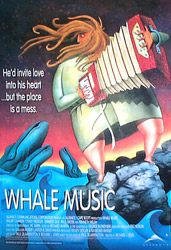 The late John Candy was a galvanizing force behind this film, which was released in 1994 (the year of Candy’s demise). An example of Canadian prestige (read: Oscar-baiting) cinema, WHALE MUSIC was based on an acclaimed 1989 novel by Paul Quarrington that presented a thinly fictionalized portrait of music legend Brian Wilson in his post Beach Boys years (Wilson himself is said to have called it “the best book about the Beach Boys that I have read”). Candy, who apparently knew Wilson, considered playing the lead role but turned it down, with the late Maury Chaykin (1949-2010) taking his place.
The late John Candy was a galvanizing force behind this film, which was released in 1994 (the year of Candy’s demise). An example of Canadian prestige (read: Oscar-baiting) cinema, WHALE MUSIC was based on an acclaimed 1989 novel by Paul Quarrington that presented a thinly fictionalized portrait of music legend Brian Wilson in his post Beach Boys years (Wilson himself is said to have called it “the best book about the Beach Boys that I have read”). Candy, who apparently knew Wilson, considered playing the lead role but turned it down, with the late Maury Chaykin (1949-2010) taking his place.
That Alliance had high hopes for WHALE MUSIC, the first-ever interprovincial co-production between Ontario and British Columbia, was evident in the fact that it was given lavish opening night galas at the Toronto and Vancouver film festivals. Its commercial performance, however, was unimpressive (total gross: $39,129), and nor did it succeed in making it onto the Academy Awards shortlist, although the soundtrack album by Rheostatics (which included “Claire,” the band’s one and only top 40 hit) became iconic in Canada.
Chaykin plays Desmond Howl, a once-famous rock star who, crippled by overeating and mental illness, has become a middle-aged recluse. Howl resides in an ancient mansion situated on the British Columbia coastline, where he spends his days splashing around in a filthy outdoor swimming pool and composing avant-garde music for the whales that congregate in the ocean bordering the property (from the novel: “The record execs say the Whale Music isn’t commercial. I say it’s not my fault if whales don’t have any money”). It’s that ocean where Howl’s late brother Danny (Paul Gross) ended his life in an apparent suicide.
One morning Howl’s sanctum is breached by Claire (Cynthia Preston), a stripper on the run. To what degree the mentally impaired Howl recognizes the reality of Claire’s presence is left unexplained, but he allows her to stay, and she warms up to him. Yes, the two develop a tentative romance (despite Howl being twice Claire’s age and size) that’s periodically interrupted by unwanted visits from Howl’s nagging ex-wife Kay (Jennifer Dale) and greedy music executive colleague Kenneth (Kenneth Welsh).
Claire at one point becomes fed up with this “weirded-out old fat man” and resumes her former profession in a sleazy Vancouver nightclub (in which Paul Quarrington cameos as a bartender). This inspires Howl (in the film’s least convincing sequence) to stage a clumsy rescue attempt that ends with him spending a night in jail. Everything ultimately works out, though, with Claire and Howl watching whales in his backyard and she assuring him (unconvincingly) that “we are gonna be okay, Des!”
This film has been criticized for being emotionally distant and disconnected, which I feel is due to the fact that, simply, the Howl-Claire romance is never convincing. Unlike the relationship depicted in the novel, in which Claire was clearly just as nutty in her own way as Howl, the onscreen coupling feels like a wish-fulfillment fantasy. Nor are the Rheostatics tunes that are supposed to have made Howl’s reputation (such as a song called “Torque Toruque,” with its lyric “Torque torque, the best needs more torque, turn it up and uncork the cork, the beast needs more torque now!”) too convincing as iconic rock anthems.
On the plus side, the art direction is top-notch, depicting a GREY GARDENS worthy atmosphere of absolute decay and degradation, incongruously placed in a stunningly scenic portion of British Columbia. That juxtaposition of ugliness and beauty is mirrored in the core love story, in which it doesn’t work at all.
As for Maury Chaykin, he’s quite strong, delivering a fearless depiction of (literal) full-bodied disillusionment that may well mark his finest-ever acting turn. Still, I can’t help but wonder what John Candy might have done with the role; if nothing else, his presence would have likely given the film the attention its makers so ardently desired.
Vital Statistics
WHALE MUSIC
Alliance Communications
Director: Richard J. Lewis
Producers: Steven DeNure, Raymond Massey
Screenplay: Paul Quarrington, Richard J. Lewis
(Based on a novel by Paul Quarrington)
Cinematography: Vic Sarin
Editing: Richard Martin
Cast: Maury Chaykin, Cyndy Preston, Paul Gross, Jennifer Dale, Kenneth Walsh, Blu Makuma, Alan Jordan, Tom Lavin, Jim Byrnes, Deborah Duchene, Paul Quarrington, Janne Mortil, Suzanne Ristic, Roman Podhora
